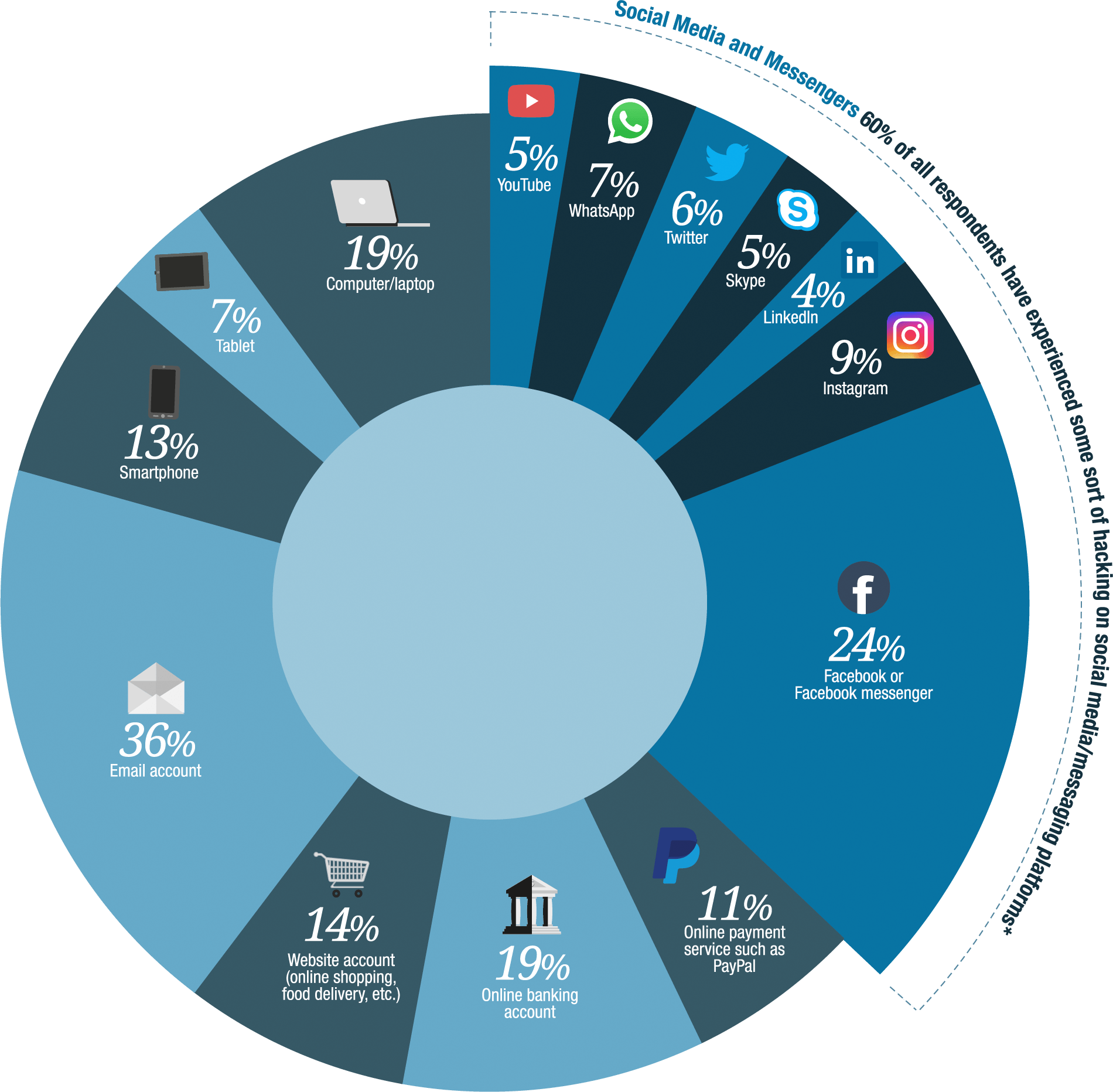ODDS OF BEING
HACKED
In an age when we live more and more of our lives in the digital space, cyber security has never been more important. So the team at Casino.co.uk was interested in finding out just how likely you are to be hacked, as well as researching ways to guard against attacks.
We surveyed 1,000 UK residents who had been victims of cyber-crime to discover which factors make you more susceptible. The results are in.

How Common Are Cyber Attacks in the UK?
- 54% were hacked 1-2 times
- 18% were hacked 3-4 times
- 22% were hacked 5 or more times

Email used to send spam

Bank data hacked and misused

Products bought under your name online

Details used to access private health insurance

Details used to participate in criminal activity

Personal data used to create a fake account
Other methods

Credit card stolen/cloned
More than half of the people we canvassed, 54%, had been hacked once or twice. But 22%, almost a quarter, had been victims five times or more.
By far the most common form of cyber-attack was the use of someone’s email to send spam. That had happened to 39% of those surveyed.
That’s not the full story, though. As expert Steve Weisman put it: “Many people recognised their email was used to send spam, but fail to recognise the larger problem of their computer being hacked and made part of a botnet that can also distribute malware.”
Highest Hacking Risks
-
 19%
19%Computer/laptop
-
 7%
7%Tablet
-
 13%
13%Smartphone
-
 36%
36%Email account
-
 14%
14%Website account (online shopping, food delivery, etc.)
-
 19%
19%Online banking account
-
 11%
11%Online payment service such as PayPal
Social Media and Messengers
-
 24%
24%Facebook or Facebook messenger
-
 9%
9%Instagram
-
 4%
4%Linkedin
-
 5%
5%Skype
-
 6%
6%Twitter
-
 7%
7%WhatsApp
-
 5%
5%YouTube

What was hacked?
* Respondents were able to select multiple options (all that were applicable to their hacking experience)
Social Media and Messengers
Age range of those hacked on social media
- 79% 18-24 years old
- 72% 25-34 years old
- 68% 35-44 years old
- 31% 45-54 years old
- 26% 55+
Millennials don't appear to take proper precautions in many instances. While they may appear to be more tech savvy, that knowledge does not appear to extend to taking proper precautions when using technology.- Steve Weisman, JD
It’s very clear where the most vulnerable point was for the people we surveyed. More than one-third of participants had their email accounts hacked.
That was almost twice as many as the numbers who had been targeted through their computer or laptop, or online banking account – 19% each.
Of the most popular social media platforms, Facebook and its associated Messenger facility appeared to be the riskiest to use, with almost a quarter of people hacked through them.
Interestingly, the level of risk reduced steadily as we moved up through the age groups. The proportion of 18-24-year-olds who had been hacked was more than three times as high as that of over-55s.
Are Brits Guilty Of These Risky Behaviours?
-
22%
Making payments over a shared Wi-Fi network
-
23%
Accepting a request from a stranger on social media
-
36%
Making payments with a smartphone
-
29%
Sharing location on social media posts
-
38%
Using banking software on a smartphone
-
22%
Giving personal number or email on social media profile
-
17%
Using banking software over a shared Wi-Fi network
-
29%
Giving date of birth information on social media profile
-
26%
Sharing a post stating it’s your birthday on social media




Most popular passwords
 12%
12%
Name of your hometown
 8%
8%
Location of your wedding
 18%
18%
Date of birth
 18%
18%
Pet name
 9%
9%
Name of your spouse or sibling
 6%
6%
Name of a football team or player
 17%
17%
Mother’s maiden name
None of the above
I find it distressing that so many people provide personal information on social media with little apparent concern about how this information could be used to make them victims of identity theft.- Steve Weisman, JD
Simple digital transactions that many of us take for granted carry a degree of risk. Of our sample, more than a third had made payments with a smartphone and used banking software on their mobile device.
However, it’s worrying to see just how many people in the UK use passwords based on data that is both predictable and publicly available.
Brits reveal information that puts them at risk of being hacked and having their data stolen. Nearly three in 10 give their date of birth in their social media profile, for instance.
With almost one in five also using their birthday as a password, it's obvious the hackers sometimes get an easy ride.
Weisman added: “We often are our own worst enemy. Along with providing personal information on social media that can be used in ways such as being able to answer security questions, it also makes people more susceptible to specifically tailored spear phishing emails and text messages.”
Staying Safe Online
-
8%
Use a password manager program such as Password Safe or LastPass

-
21%
Use a different password for everything

-
37%
Use just a few
different passwords
-
14%
Use similar variations of the same password

-
6%
Use the same password
for everything
-
5%
None of the above

How Often Do Brits Update Their Passwords?
Once every 6 months
Once a month
Once every few years or less often
Once a week or more often
Once a year
Once every few weeks
Never
Steps Taken To Stay Safe Online
-
5%None of the above
-
38%Password using letters, numbers, and symbols
-
6%Voice recognition
-
27%Number password
-
4%Iris scanner
-
10%Face recognition
-
4%Anti-Robocall technology
-
30%Fingerprint recognition
-
9%Always use a VPN when online
-
15%Dual factor authentication
-
5%Never make purchases online
-
5%Letter password
-
8%Never use online banking
-
30%Private setting on all social networks
-
13%Encrypted email
-
40%Antivirus and firewall programmes
-
13%Unlock pattern
Two of the more obvious security methods people can use is to have multiple passwords, and to change them frequently.
However, fewer than a quarter, just 21%, have different passwords for all their digital touchpoints. Almost twice as many as that, 37%, say they have “just a few” passwords.
Where Brits really leave themselves open to possible cyber-attacks is the frequency, or lack of it, with which they change those passwords.
Fewer than three in 10 update their passwords once a month or more. In contrast, 37% admit they make a change only once a year or even less often than that.
Interestingly, it’s the older generation who take more care with their password security, possibly because they didn’t grow up taking the digital world for granted.
Some 33% of over-55s use different passwords for everything, compared to only 16% of those aged 25 to 34.
We’ve seen already that oversharing your personal information can increase your vulnerability to a cyber-attack.
So it’s concerning that only 30% of the people we surveyed ensure they use a private setting on all their social media networks.
Similarly, the proportion of people who use anti-virus and firewall protection is worryingly low at just 40%, while only 38% use a secure combination password.
As long as people carry on thinking it won’t happen to them, it will keep happening to them.
Methodology
Using OnePoll, we surveyed 1,000 UK residents who have previously been victims to Cyber Security crimes, to ask them about how they were hacked and learn more about their online behaviours.
Contributors
-
 Read more
Read moreSteve Weisman is a lawyer, author, professor at Bentley University where he teaches White Collar Crime and one of the country's leading experts in identity theft and scams. He writes the blog scamicide.com where each day he provides newly updated information about the latest identity theft schemes, scams and cybersecurity developments. Among his books are Identity Theft Alert and The Truth About Avoiding Scams.
-
 Read more
Read moreOnePoll is part of the SWNS Media Group, the largest independent press agency in the UK, which generates over 30% of national news each day. OnePoll specializes in intelligent research – interacting daily with their trusted and engaged panel to deliver richer, more valuable insight.



